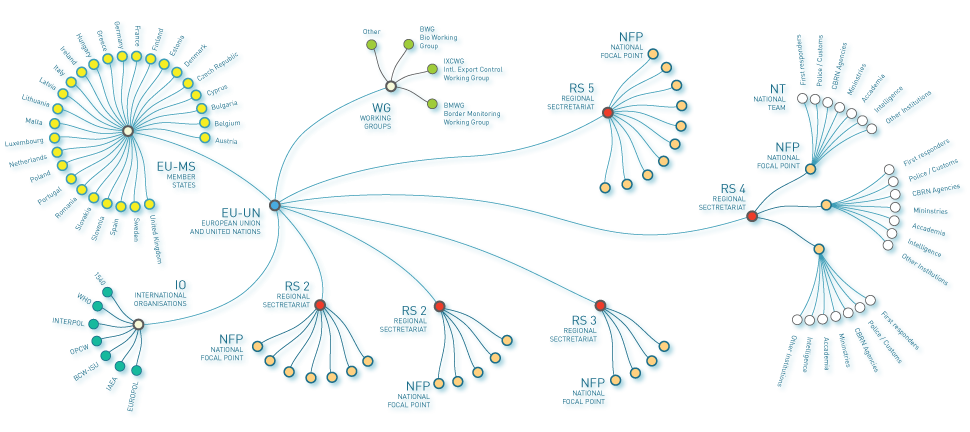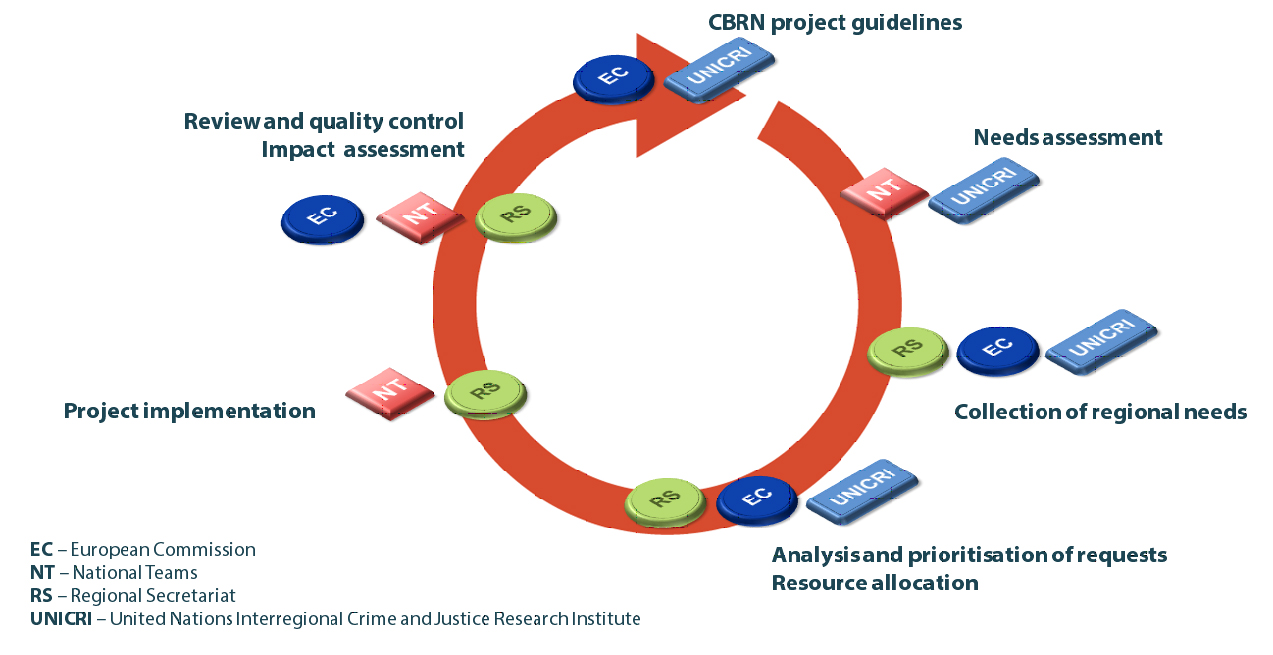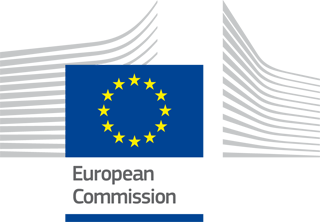

CBRN Risk Mitigation and Security Governance Programme
CBRN Centres of Excellence



1. Rationale
While knowledge and expertise needed to mitigate CBRN risks of criminal, accidental or natural origin are available at national, regional and international levels, these resources are often not effectively used. Lack of coordination and preparedness at national levels and fragmentation of responsibilities within a region can have dramatic consequences: non-state actors trying to acquire CBRN materials or expertise will exploit this situation, and an incoherent response will broaden the impact of a CBRN incident. This is why the European Union (EU) has been putting in place a framework providing for cooperation and coordination between all levels of government and international partners.
The EU Instrument for Stability which funds the EU CBRN Risk Mitigation CoE Initiative with the estimated amount of 95 million EUR for the 2007-2013 period has been mobilising national, regional and international resources to develop a coherent CBRN policy at all levels, thereby aiming to ensure an effective response.
The establishment of regional Centres of Excellence is a cornerstone of these activities: offering a coherent and comprehensive approach covering legal, regulatory, enforcement and technical issues.
2. Innovative approach
The EU CBRN Risk Mitigation CoE Initiative as an innovative approach is based on the following principles:
- Networking, regional and international partnerships, consolidating, coordinating and optimising existing capabilities in terms of expertise, training, technical assistance or equipment.
- Addressing regional CBRN needs through specific tailored projects in fields of concern such as: protection of CBRN material/facilities, public and infrastructure protection, denying support for CBRN misuse and terrorism, border control/border monitoring, export control, transit and trans-shipment control, safeguarding CBRN information diffusion, bio-safety/bio-security, illicit trafficking, CBRN waste management, first response, public health impact mitigation, post incident recovery, investigation and prosecution, crisis response.
- Strengthening a regional culture of safety and security by increasing local ownership, local expertise and long-term sustainability.
- Institutional capacity building at regional and national levels; reinforcing of national CBRN policy, improving of institutional capacities in legal, regulatory, control, scientific/technical support and law enforcement domains.
- Promoting a coherent interagency approach to enhance coordination and effective response.
- Enhancing cooperation with international organisations and EU member states to ensure synergy and avoid duplication of efforts.
- Enhancing coherence and visibility of the EU action.
3. Structure
Overall coordination
The EU CBRN Risk Mitigation CoE Initiative is implemented jointly by UNICRI and the European Commission's Joint Research Centre (JRC). Overall coordination of the Initiative is carried out by UNICRI and JRC in close cooperation with the European Commission's Directorate General for Development and Cooperation - EuropeAid (DG DEVCO) acting as the Initiative's Decision Making Body and the European External Action Service (EEAS).
Regional coordination
Within the CBRN CoE structure there will be a series of Regional Secretariats. CoE Regional Secretariats will soon be operational in the following regions:
- African Atlantic Façade;
- North Africa and Sahel;
- Central and Eastern Africa;
- Middle East;
- Gulf Cooperation Council;
- Central Asia
- South East Asia;
- South East and Eastern Europe.
The Regional Secretariats will play a major role in the regions in ensuring that there is a good level of cooperation and coordination with partner countries through their CBRN CoE National Focal Points and in facilitating the implementation of projects in the region.
In particular, the Secretariats will be responsible for supporting countries in the development of CBRN National Teams, identification of needs, development and improvement of CBRN National Action Plans and monitoring of the approved projects.
Every six months each Regional Secretariat will organise a Round Table meeting for all National Focal Points in the region to coordinate activities, exchange views and opinions and to ensure the sustainability of the CBRN CoE network.
Structure within partner countries
All countries in the region nominate a CBRN CoE National Focal Point who has the responsibility to set up a National CBRN CoE Team composed of national experts from various bodies and ministries operating in the field of CBRN risk mitigation. The National Teams, being the key player of the Initiative, are responsible for assessing the countries' needs and promoting the coordination of CBRN policy among the relevant institutions at national level.
International and regional organisations
As part of the CBRN CoE network there are also international and regional organisations working in the fields related to CBRN risk mitigation. Each organisation contributes with its own unique support according to its mandate.
The following organisations collaborate with the CoE: IAEA, OPCW, UNODA BWC-ISU, WHO, INTERPOL, EUROPOL, UN SC 1540 Committee.
EU Member States
There are officially nominated Points of Contact for matters related to the CBRN CoE from the EU Member States.
4. Cycle of Activities
A cycle of activities has been defined in order to achieve the objectives of the EU CBRN CoE Initiative, starting from the partner countries' needs assessment at the local level to the quality control of the activities.

CBRN Guidelines development
The CBRN CoE Initiative relies on the dissemination of a methodology, based on CBRN Needs Assessment Tool (NAT), Guidelines for the CBRN National Action Plan, Guidelines for setting up a CBRN National Team including the concept of the good governance, Guidelines for Regional Secretariats, and Guidelines for submitting Project Proposals. The JRC and UNICRI develop and maintain CBRN guidelines, together with participating regional/international organisations (e.g. IAEA, WHO, OPCW) and other stakeholders. The CBRN methodology provides criteria for assessing partner countries' needs and mapping relevant capabilities to address the needs.
Needs assessment
Based on the CBRN methodology, CBRN CoE National Focal Points and their CBRN CoE National Teams are responsible for assessing their respective national needs. Following the assessment, National Teams develop their own National Action Plans with the ultimate goal of developing or improving an integrated CBRN Policy.
Collection of Regional Needs
Partner countries represented by the CBRN CoE National Focal Points provide feedback to the Regional Secretariats. The Regional Secretariats analyse the information provided by National Teams, review partner countries' needs and coordinate preparation of project proposals of regional concern to address potential gaps identified. The European Commission's Directorate General for Development and Cooperation EuropeAid (DG DEVCO) acting as the Initiative's Decision Making Body evaluates and selects project proposals for funding in evaluation rounds which take place twice a year.
Project implementation
Under the supervision of the Regional Secretariats and the European Commission, contracted resources together with the National Teams implement the projects. The Regional Secretariats also provide logistical support when necessary.
Review and quality control
The European Commission, together with the Regional Secretariats and the National Teams, evaluate implementation of activities, and carry out quality control, review and impact assessment. The analysis of the review and feedback will provide the basis for improving the CBRN guidelines, the technical support and the management of the network.
FURTHER INFORMATION:
Any queries or requests for additional information regarding the implementation of these projects should be addressed to coeprojects unicri.it.
unicri.it.
For general information concerning the EU CBRN Centre of Excellence Initiative or UNICRI, please consult the official websites:






